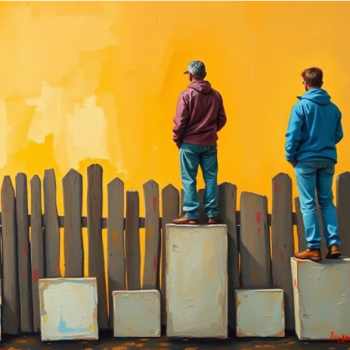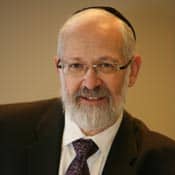"If you want to understand us, study our story, learn of our pain." That is what Jews told Christians who wanted to build new bridges of respect after the Holocaust. Ironically, when Christians begin listening to the story of the Jews, they are finding reflections of themselves.
Christians who listened learned of a Jewish history written in blood from ancient to modern times. When they thought of Christian martyrdom, on the other hand, they had to turn for the most part to antiquity, to early Christianity under the thumb of Roman emperors.
That has all changed. While Jews feel threatened by the massive explosion of global anti-Semitism in the last years, coupled with Iranian and Islamist calls for the genocidal destruction of all Jews, very few Jews in 2013 are dying because of their faith or their roots. Christians, on the other hand, have become the New Jews.
That term used to be a theological one, telling the faithful that G-d's covenants with the Jewish people had been rewritten in favor of new beneficiaries: Christians. Today, however, it means that Christians have succeeded Jews as the numerically most persecuted people on the face of the earth. In a huge swath of territory from Nigeria east and north to Iran and Pakistan, millions of Christians live in fear of losing their property or their lives simply because they are Christians. In the Assyrian Triangle of Iraq, the campaign of church-burning, clergy-killing, and terror has all but decimated the historically oldest Christian communities. Egypt's Copts, a full 10 percent of her population, treated for decades as second-class citizens, now face an even more uncertain future as Egypt's constitution moves the country closer to Sharia.
Christians who study Jewish history learn that for close to two thousand years, even when Jews were not being killed, they were terrorized from cradle to grave. They could not speak their mind or voice opinions about political matters. Anything they said might be used against them with deathly consequences as leadership changed, or rulers changed their minds about protecting "their" Jews from expulsion or death. Moreover, on the rare occasion when they enjoyed enough protection to speak or act, they knew that they might be endangering their coreligionists elsewhere, and so learned to remain mute even in the face of horrific tragedy.
Christians today have learned to keep silent while their hearts are exploding with rage. Clergy in Muslim countries have had to turn the other cheek not for religious and moral reasons, but because speaking up against their masters would endanger too many in their own community, or in those of nearby countries. The only country in the Middle East in which Christian population is increasing and Christians enjoy complete freedom of religion is Israel. Yet many Christian clergy in the Palestinian territories and in Lebanon parrot the anti-Israel invective of those who control their neighborhoods.
Christians learn that for two thousand years, Jews had no place to call home. They were at-will residents, often having to buy the right from some local ruler simply to breathe. The emergence of the State of Israel changed that, but that change is imperiled by a growing chorus of voices calling for the dismantling of the Jewish State. Amoz Oz put it best. "In the 1930s our enemies said: Jews to Palestine. Now they say: Jews out of Palestine. They don't want us to be here. They don't want us to be there. They don't want us to be."
As hard as it is to believe, Christians are now beginning to face the same. Open Doors, a Christian ministry devoted to assisting persecuted believers, reported recently that despite the many centuries of Christian roots in Syria, some Islamist Syrians have been telling their Christian neighbors to "go back to their own country." In their view, Christians have become the "other," foreigners in the country in which they live.
Even where Jews were tolerated, they were treated as the refuse of mankind. Voltaire, a veritable icon of enlightenment, wrote that the Jews had never offered the world anything in the areas of art, invention, philosophy, mathematics, or astronomy. "In short, we find in them only an ignorant and barbarous people, who have long united the most sordid avarice with the most detestable superstition and the most invincible hatred for every people by whom they are tolerated and enriched. Still, we ought not to burn them." Today, Christians—especially those who take their faith most seriously—report that they feel like a scorned stepchild within general culture. They are mocked and derided, and treated as intellectual pygmies who have nothing to offer the better, more enlightened people around them.
Christians who listen to the Jewish saga begin to understand how Jews lived with themselves through the long centuries of persecution. Jews felt the power of conviction—of belief that if you are fortunate enough to possess the truth, you do not compromise or sacrifice it, even if it means that you continue on only as tiny fleck of mankind. Ironically, those who mocked Jews for their insignificance now consider voluntarily choosing to live with the same ethic. Pope Benedict XVI will be remembered, among other things, for his theological depth, for facing intellectual challenges head-on and refusing to water down what he considered essential truths. Writing as Cardinal Joseph Ratzinger in Das Salz von der Erde, he made a startling confession. "We might have to part with the notion of a popular Church. It is possible that we are on the verge of a new era in the history of the Church, under circumstances very different from those we have faced in the past, when Christianity will resemble the mustard seed [Matthew 13:31-32], that is, will continue only in the form of small and seemingly insignificant groups, which yet will oppose evil with all their strength and bring Good into this world."
Lastly, Christians are discovering their Jewish roots—how deeply dependent Christianity had been on its Jewish beginnings. As T.S. Eliot put it, "And the end of all our exploring / Will be to arrive where we started / And know the place for the first time."
That place, for many Christians today, is looking more Jewish all the time.
12/2/2022 9:02:49 PM





